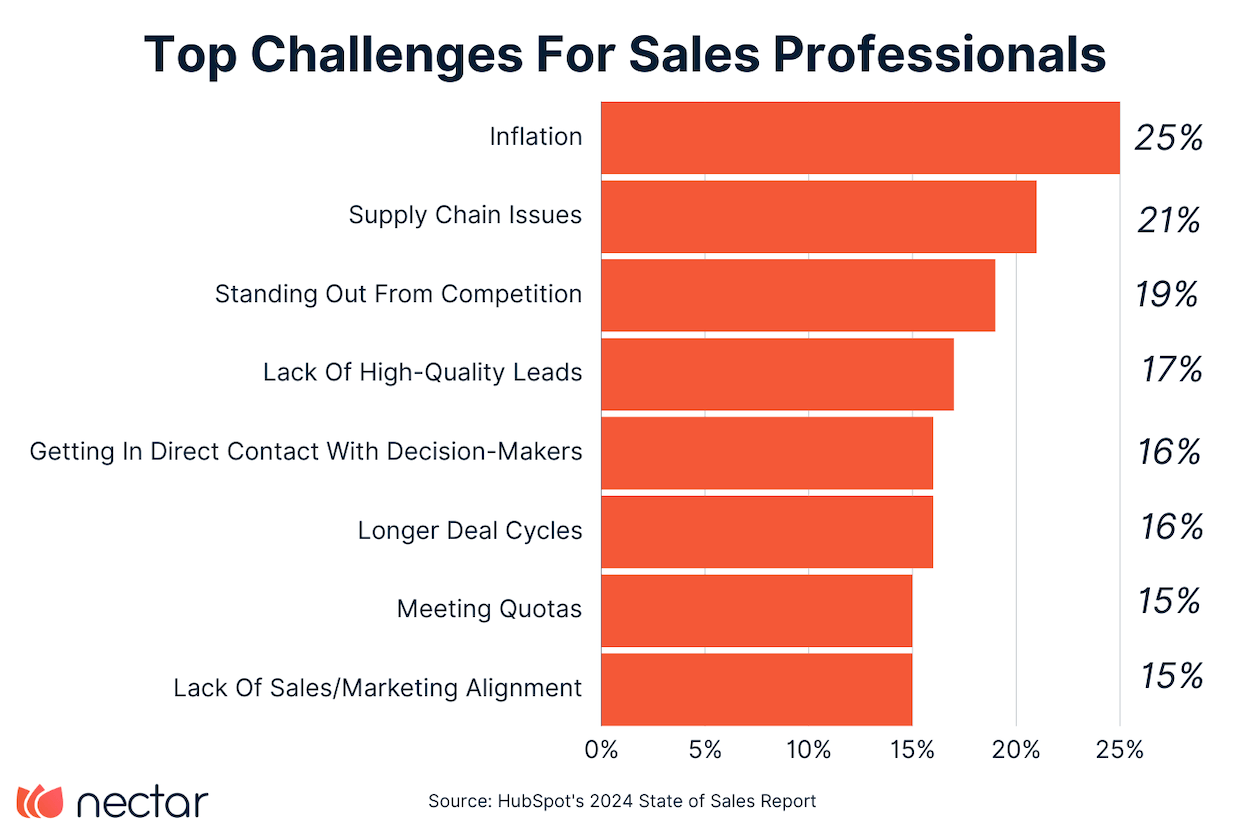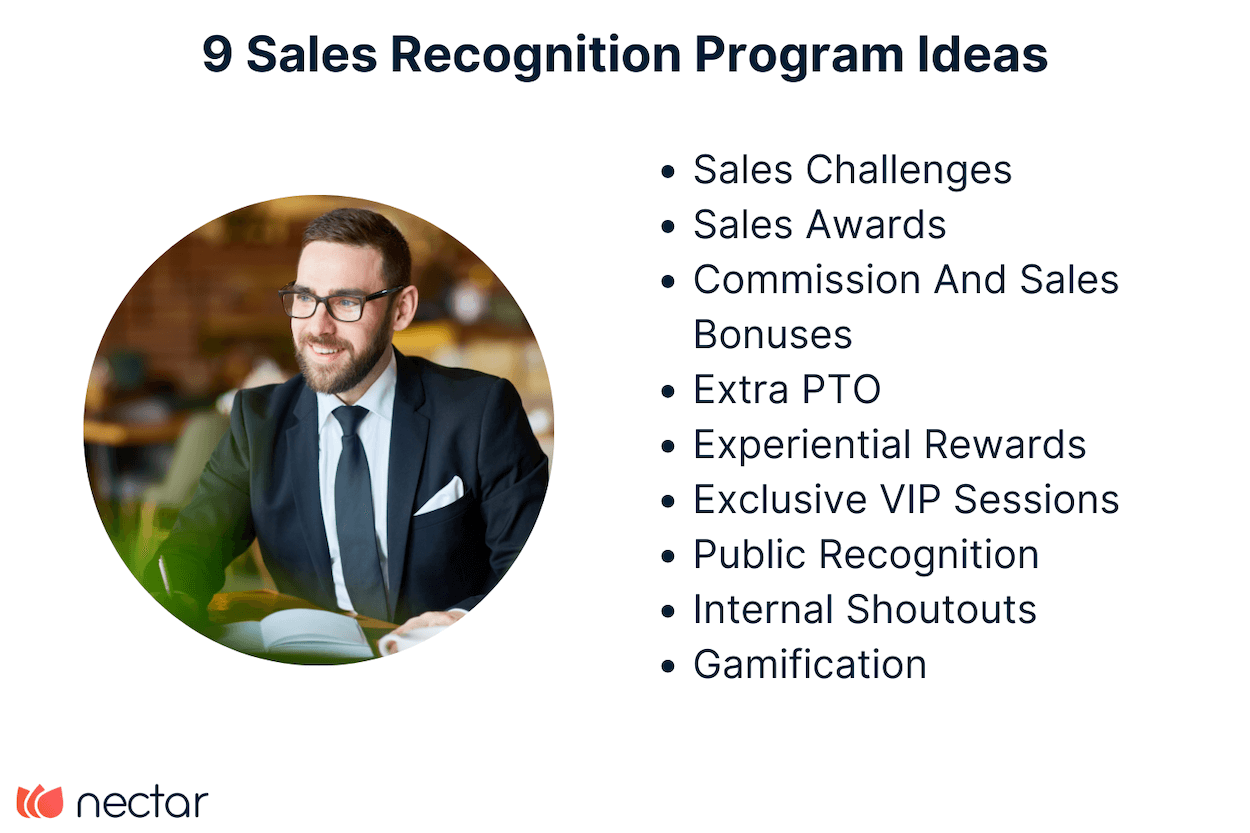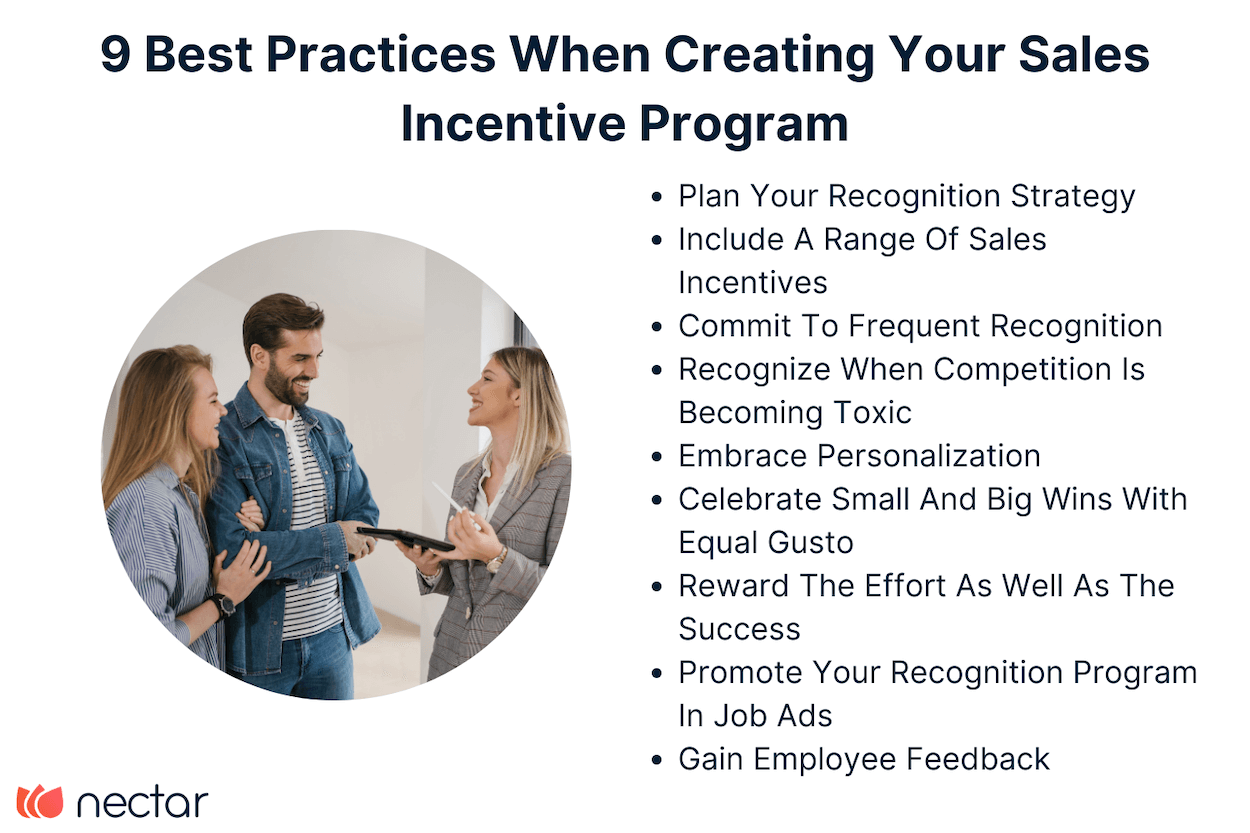
The current sales landscape is far from plain sailing—54% of sales professionals state that selling has been harder than the previous year. Factors like inflation, competition, lack of high-quality leads, and challenges reaching decision-makers have resulted in sales teams jumping through hoops to achieve an average sales win of 21%. At the same time, consumers are increasingly keen to take control of the buying process. A whopping 96% of buyers research the product or tool they're considering before reaching out to a sales representative. They've already made up their minds.

Sales recognition programs ensure your sales team remains motivated and focused to drive results in such a challenging environment. These programs acknowledge, reward, and motivate top-performing members of your sales team.
Our guide explores the benefits and best practices of running an effective sales incentive program. We'll give you plenty of reward and incentive ideas to take away and even offer insights into how we motivate our sales team at Nectar.
Sales teams don't always garner the respect and appreciation they deserve, perhaps because those outside the sales environment don't fully understand the depth of their role. HubSpot's 2024 Sales Trends report shows that sales teams spend two hours of the day selling and one hour on administrative tasks, with AI tools speeding up some of their processes. Beyond that, a ton of work goes into lead gen and prospecting, with a heavy emphasis on building relationships.
Claire Maynard, Head of Marketing & Growth at Magical, gives her appreciation to sales teams:
“I haven’t always had the best impression of salespeople. I didn’t fully grasp the complexity of the role, but after trying my hand at sales for the last few months, I have a newfound respect. There’s so much more that goes into the role than I thought—process, persistence, creativity, and more. Sales, by nature, follows a structured process, yet there are a myriad of outliers that can eat up so much of your time. Long story short, hats off to the incredible salespeople out there!”
Here are more compelling reasons to recognize and reward everyone in your sales teams.
Without sales revenue, there is no business. So, it makes sense to motivate and encourage the people who drive it. Sales recognition programs acknowledge your top performers and remind everyone of their worth to the company.
A motivated and skilled sales team can help a company outperform its competitors and is also a great recruitment tool. When job seekers notice that a sales team is well taken care of and motivated, it makes working there more attractive. This can increase applications for open positions, giving the company a larger talent pool to choose from.
Nectar recently surveyed 800 full-time US workers to understand the positive impact of employee recognition. The results speak for themselves:
If you want your sales team to achieve impressive results for your organization and bring in the big bucks, recognition can dramatically affect their ability to succeed.

Before developing a successful sales employee incentive program, you need to know the types of behavior or activities you want to see more of from your team. Consider highlighting some of the following:
Reward sales representatives who consistently exceed their quotas, close deals at faster-than-average rates, and deliver excellent customer service.
Sales can be competitive as team members work hard to smash their sales targets each month or quarter. Recognize reps who go above and beyond to help their colleagues achieve success, collaborate on projects, or mentor newer team members.
Upselling is invaluable to a business, with HubSpot data revealing that 72% of company revenue comes from existing customers and just 28% from new customers. Acknowledge and reward reps who manage this task successfully, as they're increasing your company's revenue without investing more in lead generation.
82% of sales pros say building relationships and connecting with people is the most critical part of selling and the most enjoyable part of their job, according to HubSpot. Acknowledge reps who go the extra mile to build rapport with their leads and customers, remembering the details that matter and making a genuine connection.

There are numerous ways to incentivize your sales teams into working harder, smarter, and more creatively to achieve the results your company needs. Consider incorporating a mix of the following into your own sales recognition program.
Sales challenges are fun, short or long-term initiatives you'll set up for team members to participate in. We spoke to Nectar's Co-Founder and VP Of Sales, Andrew Hollis, who shared some challenge ideas that our sales team uses at our company:
Naturally, we use our own Nectar Challenge tool to run these fun incentives, which works as follows:
Sales awards are a type of recognition often more formal than sales challenges, and they typically involve an awards ceremony and trophies. Andrew Hollis shares the awards up for grabs here at Nectar: "We do monthly awards for reps that close the most amount of revenue. We also do an award for the person that has the highest quota attainment."
Depending on your business objectives and the makeup of your team, you might also award recipients for categories like:
CEO Tony Mariotti explains the success of RubyHome’s Client Happiness Award:
“In this program, we recognize team members who go above and beyond in client service, not just in sales figures. This award has been immensely effective in promoting a client-first approach, leading to deeper client relationships and, consequently, better sales results. We've learned the importance of a more balanced approach to recognition that values all aspects of the sales process.”
Whatever sales award you choose, ensure you select relevant metrics to track progress and success. For example, you may focus on closed deals, revenue generated, customer satisfaction, or customer referrals.
Cash prizes are synonymous with sales recognition. In fact, you might work certain types of commissions or cash bonuses into your sales employees’ total compensation plans. Some options include:
Paid time off (PTO) is a popular recognition incentive, especially for sales reps working hard to achieve their goals. A rest away from the pressure of sales rewards the individual with much-needed rest and sets them up to be more productive and motivated when they return to work. Head of Sales and Marketing, Precious Abacan, explains why PTO has been a winner in her team at Softlist:
"In our company, one of our most effective employee recognition initiatives was rewarding individuals who achieve the highest sales and sell the maximum number of plans during the holiday season with a day or two off. This allows them to relax and spend quality time with their loved ones. I believe that when employees or teams go above and beyond to achieve goals, it's essential to reward them with some well-deserved leisure time after successfully completing their projects."
Rewards don't have to be something you can hold in the palm of your hand or cash in. Experiential rewards allow employees to try new activities, either solo or collectively with their sales colleagues. From escape rooms and paintballing to rock climbing and bungee jumping, there's no limit to the types of experiences you can offer your hard-working sales teams. Advertising Specialist Dave Kerr explains how this type of reward pairs well with PTO at Merged Dental Marketing:
“Beyond standard commissions, I've found experiential rewards to be highly effective motivators. For example, when a sales rep exceeds their quarterly target, we give them a paid vacation day and $500 to spend on an experience of their choice—a spa day, tickets to a sports game, a hot air balloon ride, etc. The excitement of earning these unique experiences is a powerful motivator.”
Much like a vacation, John Pennypacker, VP of Sales & Marketing at Deep Cognition, finds that experiential rewards are restorative for employees, ensuring they're ready to sell when they return to work. He told us:
“I find experiences to be rewarding as they appeal to both personal and professional growth, and not to mention, their well-being. In the end, to be honest, it's a win-win situation because they perform even better when they come back fully recharged."
Another type of experiential reward is giving your sales pros access to seasoned experts who can support their professional growth. Sales members who have won a challenge or award can receive invitations or 1:1 time with VIPs such as industry experts, sales managers for top brands, or internal executives.
This is an incentive used by Fortador's CEO and Head of Sales, Lev Tretyakov, who describes the mechanics behind the program:
“We have a program in place that recognizes our top 5% of sales reps each quarter, grants them access to exclusive sessions with industry experts, and invites them to VIP events. It is a powerful motivator for our high sales achievers and shows commitment to their growth beyond ordinary awards.”
In any recognition program, there's always a pull between acknowledging people in public or private for their hard work. Not everyone is the same, and managers must always respect personal preference, but we believe there's space for public forms of recognition. Precious Abacan explains how this works at Softlist:
“As part of our recognition program, we organize an annual award ceremony before the year concludes. Like, a literal ceremony! Turning it into a yearly tradition helps maintain our team's motivation and commitment to our company's values. For our sales and marketing team, knowing that our work is being recognized and valued by everyone can serve as a powerful incentive for us to consistently deliver our best year after year.”
Hallmark Timmins takes a slightly different approach to calling out its most successful sales team members, substituting a ceremony for an annual meeting. Founder and CEO Shawn Stack explains:
“Our annual sales kickoff meeting starts by calling out and celebrating the achievements of our top reps from the previous year. We highlight their biggest wins, share stories of how they overcame obstacles, and present them with a trophy to recognize their status as an elite performer. This public recognition in front of their peers is hugely motivating and inspires the rest of the team.”
Internal praise is equally important to sales teams, with 63% of Nectar’s survey respondents admitting they wished their colleagues told them a simple “thank you" more. Peer recognition and expressions of gratitude from internal shoutouts don't need a big budget or a lavish ceremony for a special event. But they should be frequent and consistent for best results.
We spoke to Dominic Monn, Founder and CEO of MentorCruise, who advises to “implement a system where team members can acknowledge each other's efforts. This system boosts morale but also strengthens team bonds. It's a powerful way to create a supportive and collaborative work environment. Peer recognition has a unique way of boosting morale, as it comes directly from colleagues who see the day-to-day efforts of their teammates.”
Some internal recognition ideas include:
Nectar Tip: Any message of appreciation should include a thank you and a description of the sales rep's positive behavior so they can repeat it next time. For example, "Carla, you excelled today during your cold call with Company X. Your confidence and persistence were impressive, and you successfully closed the deal. Thank you for your unwavering dedication to our team."
At its core, gamification is all about motivation. It’s the process of applying game principles and competitive elements to non-game contexts, like training or work scenarios. By turning tasks into games, employees can engage fully in their work and be compensated for their efforts with employee points, rewards, badges, and prizes.
Nectar’s Andrew Hollis explains how gamification makes the sales role more fun for team members, leading to exceptional results:
“We design challenges that gamify some of the hardest parts of the sales job. When you create incentives for making cold calls and reviewing recorded demos, it creates a culture of investing in your employees. They recognize that the work is hard, but when they see Nectar put forth an effort to make their job more engaging and fun we have seen massive success.”
Founder Bernardo Castro shared how gamified recognition works at Bybrand, including the specific features that drive sales performance.
“We add the gaming elements we think would motivate our sales teams effectively. Employees respond well to leaderboards and personalized progression bars. They can set their own weekly goals and look at statistics for areas for improvement. They seem to enjoy the challenge of competing against each other.”

Sales managers can incorporate some best practices when building their own incentive program. Use the following as a great starting point, complete with expert tips and insights:
Success starts with a plan. Include the following building blocks as you piece together your strategy:
Speak to sales managers, your CRO, CFO, HR, and even a selection of sales staff on the ground to understand what’s possible and what could motivate your entire team to achieve great results.
Before you launch a live campaign, crawl through your old sales records and reports to explore how frequently to offer certain incentives and potential times of the year when your team could use an extra boost.
It would be nice to offer rewards for everything your sales staff does. But ultimately, this may be unrealistic, especially for smaller businesses or those on limited budgets. Companies like RepVue exist to help sales professionals find an employer they love, and word will quickly spread if you're not delivering on your promises. You have to bring in more than you give out, so ensure you set up an achievable program that doesn't risk a nosedive in employee morale, your employer brand reputation, or your finances.
The "why" in your program is just as important as the "what." Create specific, measurable, attainable, relevant, and timely goals using the SMART technique. For example, you might want to improve sales revenue by X% this year or boost sales employee retention rates by X% this quarter.
There are many ways to tailor your sales incentive structure. Depending on your goals, you might incorporate some of the following elements:
Recognition programs go astray when employees don’t receive timely appreciation for great work. Nectar’s employee recognition survey reveals that weekly is the most common frequency of feedback, so waiting to give praise in an annual performance meeting would put you way behind the norm. Lev Tretyakov talks through some of the timing errors they made before landing on a more frequent cadence.
“Before we got it right, we focused on semi-annual recognition for top performers like most other businesses, but it did not work. Waiting for annual reviews was demotivating our top performers, and now we celebrate wins every two months, big or small, to keep them motivated and maintain momentum."
Will Yang, Head of Growth & Customer Success at Instrumentl, is a fan of even more frequent recognition. He explained:
“The key is making recognition timely, specific, sincere, and tied to goals. A heartfelt thank you immediately after a big contract close or prospecting blitz reinforces those behaviors much more than generalized praise or delayed recognition. With this frequent reinforcement approach, I've seen tangible increases in motivation, morale, and ultimately sales results.”
Gamification, leadership boards, and award winners are part and parcel of a recognition culture. But while a healthy competitive spirit can be inspiring and motivating, it can achieve the opposite in the wrong environment. Lev Tretyakov shares why a leaderboard system didn't work for Fortador:
“For us, a leaderboard system fostered more competition than collaboration. Those who did not make it to the top of the board were not as motivated, so we shifted our focus to team-based rewards and introduced the peer recognition channel, which has been a success.”
Remember that encouragement should be at the heart of any recognition program. Something has gone wrong if any team member sees your efforts as negative or demotivating.
The beauty of recognition programs is their versatility, especially when choosing rewards.
Dominic Monn reminds us:
"Understand that each team member is motivated by different factors. Some may value professional development opportunities, while others might appreciate extra time off or public acknowledgment. Tailor your recognition to these individual needs to truly make an impact."
Shawn Stack agrees that a personalized experience is key to tapping into your employees beyond the job to build loyalty and motivation. He shared:
“We get to know the interests and hobbies of our salespeople outside of work. One of our star reps is an avid sports fan, so we surprised her with tickets to her favorite team's playoff game, which she greatly appreciated.”
Nectar Tip: Remember to keep personalization equitable. Rewarding one sales team member with a new pair of knitting needles won't feel fair if you give their colleague Taylor Swift concert tickets, even if these are both their top passions. A workaround here is to give your employees a cash allowance or redeemable points and allow them to choose their own rewards.
Deciding what to reward can be one of the biggest challenges when setting up your sales incentive program. While the big, splashy sales goals are always worth a celebration, it's imperative to recognize smaller everyday behaviors that lead to those moments. Will Yang breaks down his approach to celebrating both big and small wins.
"For major achievements like exceeding quarterly quotas, I'll do public call-outs in team meetings and company newsletters, plus meaningful rewards like gift cards, plaques, or experiences. But I also make it a priority to recognize consistent behaviors that drive performance—things like prospecting activity, collaboration, customer service, and initiative. For those, I leverage peer recognition programs where team members can shout out co-workers for living our values, coupled with small, frequent rewards like custom gifts, early office closure, and my personal favorite - handwritten notes."
Not every attempt at success will succeed, and that's ok. Part of growing as a sales performer, team, and company is embracing new ideas, trying different things, and seeing what lands. Building a culture of psychological safety is essential here, enabling your reps to step outside their comfort zone and inspire creativity at work.
Example: You might applaud Daniella for trying a new product pitch, even if the sale didn't close. Or recognize Max for suggesting a new approach to prospecting even if it didn't yield immediate results.
Every company wants a sales team filled with star performers. And, of course, perks, commission structure bonuses, and other types of sales incentives can all help attract and retain the best. Remember to call out your recognition program as a listed perk in your ads to entice job seekers with the promise of fair rewards for hard work and results.
Is your sales incentive plan working? How do you know? Tracking quota or lead gen metrics is one way to find out, but asking your salespeople will give you gems of intel to back up your data.
Lean on employee satisfaction surveys, focus groups, and 1:1 meetings to learn what your sales pros really think. Ask them questions like:
Use this information to adjust your program and continue following up periodically to ensure your approach is still relevant and enticing to your entire team.

Ready to achieve more sales success in your organization? Nectar offers a dedicated, customizable recognition platform for any sales team size. Here are some of the features your sales team will love:
Andrew Hollis reveals what Nectar’s rewards recipients love to choose: “Most people like to spend their points on things they wouldn’t otherwise buy—a new golf club, improvements to their work setups, or gift cards for date nights.”
Wondering what your sales team would choose? Find out and start incentivizing your sales team today by taking a free guided tour of the Nectar platform.


